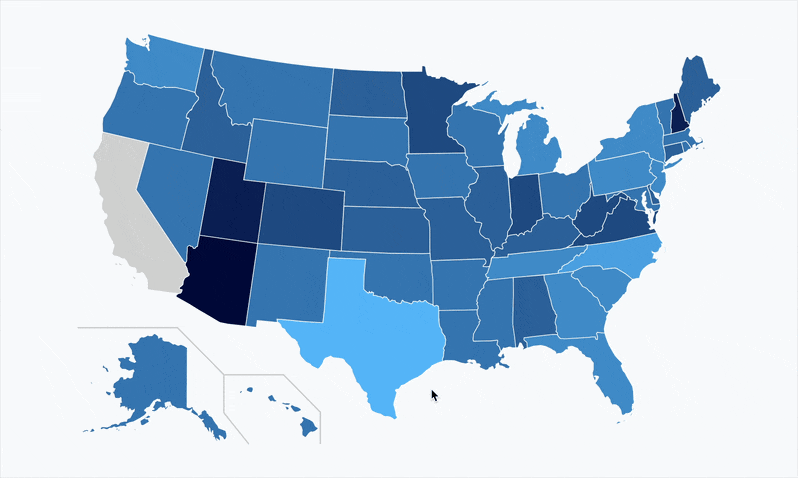Every January, Gray DI hosts our “5 Emerging Academic Programs to Watch” webinar, where we unveil a selection of nascent programs with exceptional potential. We delve into a broad array of programs across diverse industries, occupations, and disciplines, drawing on extensive data sources and futurist research. But predicting the future of emerging fields is a tricky business, as a look back at our past predictions reveals.
The Rise of Applied AI
Some fields have undeniably exploded, like Applied AI, an emerging program we featured in 2023’s 5 Emerging Programs to Watch. We’re not just talking about building massive AI models like ChatGPT (with its eye-watering costs), but about harnessing existing AI tools to solve real-world problems. This mintersection of domain expertise and technical know-how is revolutionizing everything from drug discovery to business optimization. Programs like AI for Business, Digital Art and AI, and Intelligence Manufacturing have sprung up, as well as associate-level programs like AI and Robotics at Houston Community College and Applied AI at Miami Dade College.
The Burgeoning Field of of Disinformation Intelligence
We identified Disinformation Intelligence as a burgeoning field in 2021. The need is clear – fake news is rampant, and information is increasingly weaponized. Yet, dedicated “disinformation” jobs seem to be declining. Perhaps the skills to combat disinformation are becoming essential for everyone, integrated into various roles rather than siloed. Interestingly, Swarthmore College is developing a Disinformation Studies humanities program, and American Public University offers a graduate nano certificate in Open Source Intelligence related to deception.
This highlights the crucial skill of discerning truth from fiction in the age of AI. Even advanced AI like Google’s Gemini can “hallucinate,” requiring users to be critical and cross-check information. AI predicts what’s probable, not necessarily what’s true.
The Creator Economy Takes Center Stage
In 2023, we explored the Creator Economy. This new economic engine, built by individual creators and influencers, resonates with Gen Z, who are eager to participate and demand better social media platforms. With the global creator economy projected to reach an astounding $78.91 billion by 2031, colleges are taking note. The University of Texas San Antonio launched a Bachelor of Arts in Digital Media Influence this fall, with eight students enrolled on campus and 80 students admitted for the online program. Owens Community College offers a Media Influencer certificate, Arkansas State has an undergraduate certificate in Athlete Name, Image, and Likeness, and East Carolina University partnered with MrBeast to create a program for aspiring content creators.
Space Commercialization: A Giant Leap Forward
Space commercialization, which we identified in 2021, is also blasting off! Elon Musk’s ventures have paved the way for a trillion-dollar industry, from satellite launches, to transporting astronauts to the International Space Station. While lunar and Martian bases seem futuristic, serious players are investing, and national defense concerns may accelerate our push into space. Colorado School of Mines offers Space Resources programs, ASU has an executive education program on Space Leadership, and Athens State University launched a bachelor’s degree in Aerospace Systems Management with a Space Systems concentration.
Cellular Agriculture: Cultivating the Future of Food
In 2022, we identified Cellular Agriculture, which offers a potential solution to the environmental impact of traditional farming. Although lab-grown meat that “tastes like chicken” may currently seem unappealing and faces scalability challenges, it offers potential climate mitigation benefits through reduced methane emissions, enables localized food production that eliminates supply chain costs and complications, and improves animal welfare. While dedicated programs are still emerging, Tufts University now offers the first bachelor’s degree in cellular agriculture, and research is ongoing at institutions like Purdue and UC Davis. The second annual International Cellular Agriculture Conference was held last June in Denmark.
Reflections on Predicting the Future
Looking back, we see that predicting the future is never perfect. Timing is uncertain, costs can be prohibitive, and societal acceptance is key. But amidst the uncertainty, adaptability, critical thinking, and a willingness to embrace new technologies will be essential for navigating whatever the future holds.
Don’t miss the 6th Annual Emerging Programs Webinar on Tuesday, January 14, 2025, at 2 PM ET. Gain expert insights into five academic programs poised to transform higher education and position your institution as a leader in innovation. Save your spot today!





